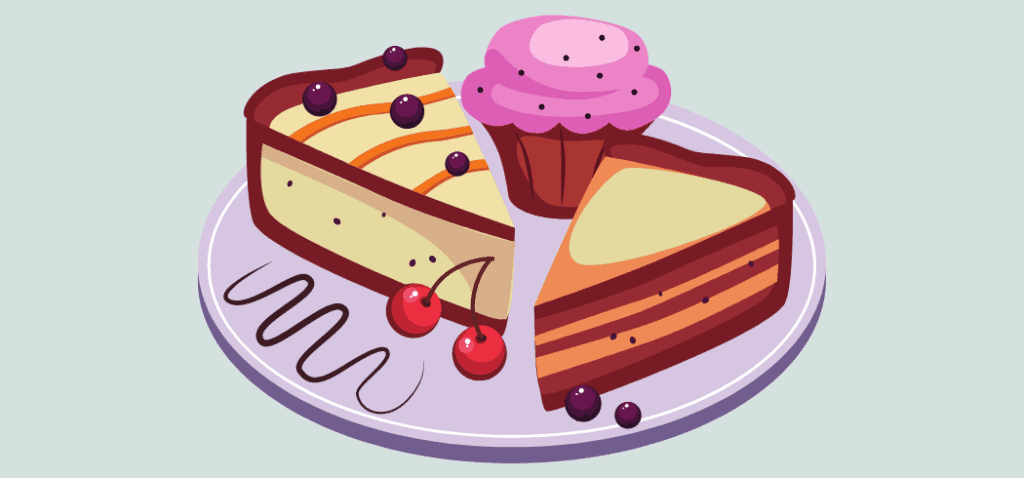Is it one S or two? When it comes to the words desert and dessert, most people struggle with the spelling, not the definition. It’s easy to know if you want to order a slice of cake for dessert versus whether you want to learn more about desert animals, but do you know which is which when it matters?
Learn how to pronounce these two words, when to use each, and how to remember their spellings.
Desert vs. Dessert: What’s the Difference?
The significant differences between desert and dessert are how they are used. Despite their similarities, these two words are not only spelled differently but are also pronounced differently.
Dessert has one definition. It is the final course of a meal, usually a sweet option such as birthday cake, apple pie, or vanilla ice cream. It is pronounced [ dih-zurt ] with an emphasis on the second syllable.
Desert has more than one definition and can be used as a noun, verb, or adjective. As a noun, it is an ecological area defined by less than 10 inches of precipitation annually. When used in this manner, it is pronounced [ dez-ert ], emphasizing the first syllable.
As a verb, it means to abandon to defect an area or your responsibilities. When used in this manner, it is pronounced the same as dessert [ dih-zurt ], emphasizing the second syllable.
As an adjective, it helps add detail and information about a noun. You can use both definitions of the words to provide this modification.
How to Use Dessert in a Sentence
Since dessert only has one definition, it isn’t challenging to use it correctly in writing.
For example:
- The decadent ice cream cake was a dessert the chef prepared for us featuring fresh fruits.
- I decided to create a dark chocolate cake and vanilla mousse dessert for the engagement shower.
How to Use Desert in a Sentence
Due to the different ways the word desert can be used, it is essential to see correct examples of how they can be used to help work them into your writing.
For example:
- Many plants that live in the Sonoran desert store water in their leaves to help combat the low moisture levels. (noun)
- The desert conditions of their camping spot made it difficult to stay cool during the day. (adjective)
- We need to be able to count on you, so please don’t desert your post during the night. (verb)
The Origins of Desert and Dessert
Both forms of desert have roots in Latin and have stayed true to their original use through the centuries. The noun, desert, is derived from the Latin desertum, meaning left to waste or wasteland. The verb desert is derived from the Latin desertus, which means to leave or abandon.
Dessert has roots in French and was developed in the mid-16th century by combining the words des, meaning last course or removal, and servir, meaning to serve. Combined, it means to serve last, or after removal of the last course.
How to Remember Desert vs. Dessert Spelling
The biggest problem people have with these words is not their definitions, but how they are spelled. At first glance, the two words look like they would be pronounced the same, but as we have seen, this isn’t always the case.
The trick to remembering the spelling of each is in the use of a mnemonic device. Mnemonic devices are memory tools used to remember information, definitions, and spelling of words and phrases. These can be rhymes, funny sayings, or words made out of letters that represent something else.
Although there are a few different mnemonic devices you could use concerning the dessert vs desert confusion, the best one to help remember how many times to use the letter S is:
- Dessert is twice as nice as desert.
Examples of Desert vs. Dessert in Writing
Joshua Tree National Park is a desert oasis … Surrounded by twisted, spiky trees straight out of a Dr. Seuss book. (USA Today)
Two U.S. army deserters have lost their court fight to stay in Canada, but supporters say the political battle will continue (The Globe and Mail)
These six restaurants (and one cafe) see the importance of an impressive dessert offering. (The New York Post)
Let’s Review
Desert means to either abandon or a dry, arid region. Dessert is a sweet selection served as a final course after the main meal.
Despite their similarities, the two words are spelled and pronounced differently (except when using the verb form of desert). Help avoid the wrong spellings using a quick and easy mnemonic and never confuse the sweet dessert with a dry and arid place or abandonment ever again.


